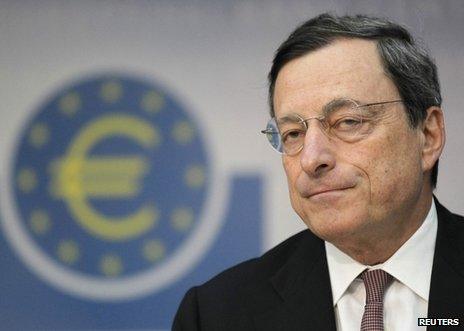Eurozone crisis: Buying time by buying bonds
- Published
- comments

All eyes are on Mario Draghi
The words of a central banker can move markets. The last week has demonstrated that yet again.
Three sessions of gains have all been built on the back of comments made by Mario Draghi, president of the European Central Bank. In a question-and-answer session last Thursday, he said the ECB would do "whatever it takes" to preserve the euro, then added, "Believe me, it will be enough."
Those last few words hinted that the much spoken-of big bazooka might be unveiled. The expectation is that the bank will buy the government bonds of Spain and Italy, forcing down their costs to stave off a full-blown bail-out.
Mr Draghi's comments were followed by what seemed an orchestrated chorus. Over the following days, the leaders of Germany, France and Italy all chimed in and said they would do what it took to protect the euro.
On Monday, Chancellor Merkel's spokesman was quizzed as to what these statements meant.
He replied that it was "the intention of all simply to send a very strong signal for the euro".
If that is all this flurry of activity amounts to then disappointment will surely follow.
US pressure
Only Jean-Claude Juncker, the head of the euro group, has hinted there might be a wider strategy out there.
The BBC's Aaron Heslehurst discusses one of the key financial stories of the day.
He implied the ECB might co-ordinate with a plan to use the eurozone's main bailout fund, the EFSF, to support countries like Spain. He promised results but then added "it still has to be decided what exactly we will do when".
US President Barack Obama did not disguise his impatience.
"I don't think ultimately that the Europeans will let the euro unravel," he said at a fundraiser in New York, "but they are going to have to take some decisive steps...
"I am spending an enormous amount of time trying to work with them... The sooner they take some decisive action, the better off we're going to be."
So the expectation is that the central bank will buy government bonds of Spain and Italy.
There is a meeting of the ECB's governing council on Thursday. The bank has intervened before. More than 230bn euros (£180bn; $282bn) were deployed but with limited impact.
The German Bundesbank is still opposed to such actions. The intriguing question is whether the Merkel government is softening its opposition.
Germany, as always, is the key. Nicholas Spiro of Spiro Sovereign Strategy points out: "The panic in Spanish and Italian bond markets stems mainly from fears that Germany is unwilling to commit itself to the level of debt mutualisation required to keep the single currency project alive."
Dr Spiro maintains that without German support, any ECB-backed measures will lack credibility in the eyes of the markets.
Beyond vanity projects
What a move by the bank cannot do is to address the fundamental issues of debt and a lack of growth.
The Spanish economy, which declined 0.4% in the last quarter, seems trapped in a cycle of decline. Only rising exports offer hope.
A Spanish minister opined that Germany should help Spain much as it was helped by the Marshall Plan.
The differences, however, are not lost on Germany. The Marshall plan was deployed to rebuild Europe after the devastation of war. Spain's debt - as we now know - arose from the vanity projects of places like Valencia, the ghost airports, the savings banks run by local politicians and a wild housing boom.
It is why Angela Merkel remains cautious. Her mantra is no extra liability for the German tax-payer without greater control over budgets.
And that brings us back to the ECB. She and her advisers recall what happened last summer. The ECB intervened to buy Italian bonds. Within days Silvio Berlusconi had rowed back on his promises to make savings and introduce reforms.
So the ECB can buy time, important time, but bond-buying alone will not fix the crisis.